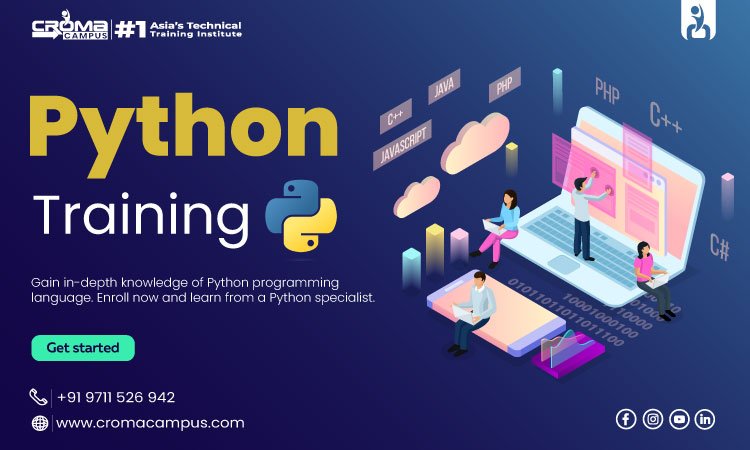Python language comes with a large standard library and built-in modules. It provides various tasks like file I/O, regular expressions, network programming, and more. Along with this, Python comes with various third-party libraries and each of them is useful for specific domains. Furthermore, Python provides cross-platform compatibility and can run on multiple platforms like Windows, macOS, Linux, and other operating systems. To learn more about it, one can visit the Python Online Course. Here are some of the significant features of Python language.
- Easy to Code- This is a high-level programming language and is effortless to learn. It ensures that anyone can learn to code in Python in just a few hours or a few days. Along with this, Mastering Python language may take longer time but its syntax is very easy.
- Easy to Read- It is an easy-to-code language that consists of simple English words. It doesn’t require semicolons or brackets, and the indentations define the code block. You can tell what the code is supposed to do simply by looking at it.
- Free and Open-Source- This is a free and open-source language that comes with an open-source license. Furthermore, it is completely free to use even for commercial purposes. Downloading Python doesn’t cost anything and it can be freely modified and re-distributed.
- Robust Standard Library- This solution comes with an extensive standard library that is available for anyone to use. Along with this, it ensures that developers don’t have to write their code for every single thing, unlike other programming languages.
Interpreted-
- This is an interpreted language and its source code is executed line by line, and not all at once. Along with this, there is no need to compile the Python because it is processed at runtime by the interpreter.
- Portable- Being a portable language, it ensures that the same code can be used on different machines. Along with this, Python can be easily run on Windows or Linux without having to make any changes to it. Above all, it ensures that there is no need to write a program multiple times for several platforms.
- Object-Oriented and Procedure-Oriented- This programming language focuses design around data and objects and it is procedure-oriented. Along with this, it focuses more on functions. Furthermore, this language also supports both object-oriented and procedure-oriented programming.
- Support for GUI- This language provides great support for GUI or Graphical User Interface. Along with this, it ensures that a user can easily interact with the software using a GUI. Furthermore, Python offers various toolkits, such as Tkinter, wxPython and JPython.
- High-level Language- This is a high-level programming language that ensures that programmers don’t need to remember the system architecture. Thus, making it super programmer-friendly and is one of the key features of Python.
- Simplify Complex Software Development- This language is useful for developing both desktop and web apps and complex scientific and numerical applications. Along with this, it offers great data analysis features to create custom big data solutions without much time and effort.
- Dynamic Binding- This Python feature helps the variables to bind to objects dynamically at runtime. It ensures that you do not have to explicitly declare the data type of a variable when it is created. Instead, the interpreter determines the variable’s type based on the value assigned to it.
Career Opportunities in Python
Python is a versatile and widely used programming language that offers a diverse range of career opportunities. In addition, there are many career opportunities available in Python and the specific role you choose will depend on your interests, skills, and career goals. Many institutes provide Python Certification Course and enrolling in them can help you start a career in this domain. Here are some of the necessary careers you can explore after learning the Python language.
Some Key Points
- Software Developer- These professionals have to develop web applications, desktop applications, and mobile apps using Python frameworks. They also work on backend development, handling server-side logic and database interactions.
- Data Scientist- Their primary job role is to analyze and interpret large datasets to extract meaningful insights. Along with this, they also have to utilize Python libraries like NumPy, Pandas, and Matplotlib for data manipulation and visualization.
- Data Engineer- As a Data Engineer, you will be responsible for designing and building the data pipelines and data warehouses. Their job consists of extracting, transforming and loading the (ETL) data from various sources.
- Machine Learning Engineer- These professionals have to develop and implement machine learning models using Python libraries like TensorFlow, Keras, and Scikit-learn. Along with this, they also have to work on tasks such as natural language processing and predictive analytics.
- DevOps Engineer- As a DevOps engineer, these professionals are responsible for automating infrastructure management and deployment processes. Along with this, these professionals also have to collaborate with development and operations teams to improve software delivery.
- Web Developer- These professionals are responsible for building dynamic and interactive web applications using Python frameworks. Along with this, they also have to handle both front-end and back-end development.
- Scientific Researcher- These professionals are responsible for using Python for scientific computing, data analysis, and simulation. Along with this, they also have to analyze research data and develop new models and algorithms.
- Automation Engineer- As an Automation engineer, you have to work on automating repetitive tasks and processes using Python scripting. Along with this, these professionals also develop automation tools and frameworks.
- Game Developer- These professionals are responsible for creating the games using Python game engines like Pygame. Along with this, they also have to develop game logic, graphics, and user interfaces.
Conclusion
Python is a popular highly versatile and powerful programming language. This language offers a wide range of career opportunities and benefits. Its readability, simplicity, extensive libraries, and cross-platform compatibility make it an attractive choice for developers of all levels. By mastering Python, you can open doors to exciting career paths in various fields, from data science and web development to automation and scientific research.




